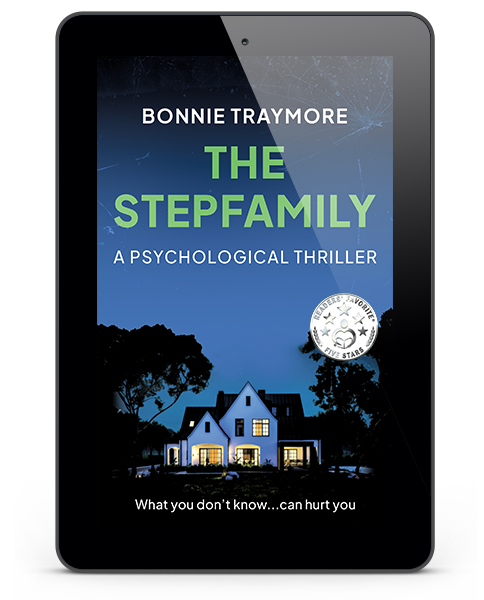I’ve never felt at home in this family because it’s not really mine. But I try. Why? I don’t really know. I could speak up. I could protest. I could leave. But I don’t.
My husband is tenser than usual this morning. I can see it in his jawline when he walks into the kitchen.
“How’s the approval coming?” I ask.
“Oh, you know, the usual hurdles. Nothing to worry about,” he replies. He tries to hide it, but his discomfort breaks through. His voice is a little singsongy, always a sign that something’s up.
He walks over to the coffee pot, pours himself a cup, and pops a slice of bread in the toaster. A dark blue tie hangs loose around his neck. He never wears one. Hardly anyone in Silicon Valley does, so it must be an important day. But for some reason, I don’t think his unease has anything to do with work.
“Got a big meeting today?” I ask.
“The board wants an update,” Peter replies.
“Aren’t you just waiting for the FDA?”
“Yeah.”
“So, isn’t that the update?”
“Yeah.” He smiles. “But you know how they are.”
Then he shrugs, and I smile back. He butters his toast and pours some more coffee into a travel mug. I can tell that’s all I’m going to get out of him. He’s a calm man—most of the time. But he does have a temper, and even after twelve years, I still can’t tell what might set it off. I can tell he’s stressed, so I leave it alone.
I watch him walk over to the large beveled mirror that hangs in our dining room. He fastens his tie in one fluid motion. It looks sexy. Masculine. Commanding. The way he snaps it up and down at the same time to force it into compliance. He’s older than me, but he still gets my heart racing with his salt-and-pepper hair and chiseled physique. His sleeves are rolled up a bit, exposing his muscular forearms.
He walks back to the kitchen and wolfs down his toast. Standing at the island countertop, I continue to make a veggie sandwich to pack for lunch. He places his dish in the sink behind me. We don’t speak. It’s a comfortable silence, but I can’t shake the feeling that something is up.
I turn around to face him. “Well, I’m sure you’ll dazzle them.” I smile and rest my hand on Peter’s bicep. I run my thumb across its taut surface.
“I don’t know about that.” He places his hand on my shoulder, leans over, and gives me a peck on the lips. “Have a good day.” Then he grabs his coffee and heads out the side door to the garage.
I hear his car start and the garage door rise up. We have a two-car garage, but there’s only space for one car because he’s got all kinds of tools and sports equipment that take up the other half. It was like that when we started dating. Only one car in the garage. Twelve years later, my car still sits in the driveway.
I don’t belong here. I’m still a visitor. Just like my car.
***
I’m searching through my clothes rack, second-guessing myself once again. I turn to look at myself in the full-length mirror that hangs on the opposite side of my closet. My navy skirt sits just above the knee, and I worry that people might think I’m playing up my sexy legs. But I’m not. It’s just how my legs look. I don’t want to wear pants. My blouse is modest, and I tell myself to stop being so insecure. I pull out a few different pairs of shoes from the cubbies and try them on. I land on strappy sandals with a medium heel. They’re dark, almost the same color as my hair. I look professional but in a confident, sexy way. It’s fine.
I have a big day today too. My career is really taking off. Finally. I was so young when I met Peter. Only twenty-seven. I’d just finished graduate school, a marketing MBA, and at first, there was too much going on in our lives to do much of anything with it. But I’ve made up for lost time. And I recently got a big promotion. Laura Sato Foster, Vice President of Monetization. Is that what’s making him uncomfortable? The fact that I might not need him anymore? He’s always been a big supporter of my career. It can’t be that. But something is bothering him, that’s for sure. He even rejected my advances last night, which he’s never done before. He just turned fifty, and I hope it’s not a sign of what’s to come.
I make my way downstairs and out the front door to the driveway where my car sits. It’s a silver Audi A6, so it’s not an over-the-top choice, especially for this area, but it’s certainly garage-worthy. I plop my satchel in the trunk, and then I notice something. A small stream of fluid is running out from under the car. We live in Los Altos Hills near the top of a long road—a very winding and steep one. Our driveway also slants down a bit; otherwise, I don’t think I would have noticed the fluid. Thank goodness for gravity.
I’m a bit neurotic, the kind of person who runs back into the house to make sure the stove is off. I always pump my brakes before I back out of the driveway. Losing brakes on a hill like the one we live on could be fatal, and while that trickle of liquid could be anything, I have a sinking feeling in my stomach.
I open the car door and get behind the wheel. I press the start button and see the brake indicator light up. Then I step hard on the brake pedal. There’s a slight resistance at first, but then my foot sinks to the floor. I realize then that it must be the brake fluid—one of my biggest fears. I feel a strange tingling in the back of my head.
I try not to catastrophize, but it’s a pretty new car, although it’s due to be serviced. Do brake lines start leaking for no reason? Probably not. Even before I call for help, I know this isn’t good, and my stomach lurches as I consider the implications. It’s quite possible that someone has tampered with my brake line.
Someone who’s out to get me?
TWO
A police officer sits across from me at our imposing dining room table. It’s pretentious and formal—not my style—and I feel awkward sitting so far away from him. I would have rather sat in the living room, but this is where he sat. The officer is about forty, with a few extra pounds on his large frame. He seems less than enthused with the assignment. I decided to have the authorities meet me at home so the police could have a look at the car before it got towed in. I was too flustered earlier to make a decision about what to do. After the mechanic came and told me it was the brake line—or, more specifically, the right front brake hose—I told him to leave it there and hopped into an Uber to get to work for my meeting.
“So, what time did you go out to your car, again?”
“About eight thirty this morning,” I repeat.
We’ve already been over this. Why is he asking me again? I can’t tell if he’s actually concerned about the possibility of a neighborhood vandal or if he’s humoring me. He did inform me that the department has been on the lookout for this sort of thing based on warnings from other municipalities. But then he assured me that, as far as he knew, the Bay Area had so far been spared. I worry now that he’ll think I’m paranoid if I ask him to dig further.
“And there’s nothing on your security camera?”
“No. I have a pretty clear shot of the driveway from one of the cameras, and I didn’t see anyone tampering with my car.”
“The break is pretty jagged, at least on one side, based on these photos, so my best guess is that it probably got sliced by some road debris that got up into it like your mechanic suggested. Then it wore down and broke.”
“Or someone could have cut it in another location,” I say.
“True, but then they didn’t do a very good job. That would mean they didn’t know enough to cut it all the way.”
“Maybe they got interrupted. Or wanted to make sure my brakes went while I was driving.”
“Could be. But you’d probably have noticed it on your way home.”
“The mechanic said it might take a few miles to notice if it was a small cut to begin with.”
The officer nods. I can tell he thinks I’m being paranoid. I consider asking him to dust for prints, but since he doesn’t bring it up, I assume it would be an inappropriate suggestion. The mechanic’s prints are probably all over it anyway. And if someone was trying to kill me, wouldn’t they be smart enough to wear gloves?
I hear a car pull up to the house and wonder who it could be. This doesn’t seem like it would warrant another officer. The car stops in the driveway, and I hear a door slam. Then I hear someone running.
What the hell?
I stand up, and so does the officer.
A moment later, Peter comes bursting through the doorway. He runs up to me before I can react or say anything.
“What’s happening?” Peter’s face is pale, as if he’s seen a ghost. I can see sweat beads forming, about to drip from his temples. I should have called to tell him about this, but I knew he had an important meeting. I didn’t want to worry him until I knew more. But what is he doing home so early? It’s only three in the afternoon.
After my meeting, which went swimmingly, I told Bethany about my car, and she encouraged me to go handle it. She’s a hard-ass when it comes to work, but she’s not a monster, and she seemed genuinely concerned. More than the officer standing next to me but much less so than my husband, who looks like he’s about to have a stroke.
He takes my face in his hands. “Laura? Are you alright?”
“I’m fine, Peter.”
“What’s going on? Why didn’t you call me?” My husband is frantic, and I don’t get it. I’m obviously fine.
“Everything’s okay, Mr. Foster,” the officer informs him. “Please. Have a seat.”
So we sit down and take Peter through the whole story from the beginning. I’m much more of a worrier than my husband is, so I expect him to brush it off. And he does, on the surface. But I can tell he’s faking it. And I don’t have a clue as to why.
“Well, Laura, if there’s nothing on the security camera, I’d say it’s pretty safe to assume that it was an accident,” Peter says. But he’s addressing the officer, avoiding eye contact with me. His lips are pressed together, and his jaw is tight. I feel like his words are at odds with his body language.
But then maybe his mood has nothing to do with the brake situation. Maybe it’s the same issue that was bothering him this morning, and he came home early to talk to me about it. But how would he know I was here?
We wrap things up and see the officer to the door. He assures me they will “check into it,” but I’m not holding my breath. I close the door behind him.
Then Peter lets out a deep sigh and almost collapses on the floor. He bends over and puts his hands on his knees, taking deep breaths, looking like he might pass out. Maybe he’s not feeling well, and that’s why he came home early?
“Laura, I thought…”
And then it hits me.
The last time a police officer was here, it was to give him some terrible news. He has seen a ghost today. The ghost of Cynthia Foster—his college sweetheart, the mother of his children, the woman whose home I inhabit.
I lived in Silicon Valley for eight years, and my husband worked in venture capital funded biotech firms. I thought it would be interesting to set the book there. Although it’s predominately a domestic suspense thriller, there are side plots about both the husband and the wife’s workplaces that reflect the region and its high tech, fast-paced culture. The issue of the pros and cons of technological advancement is embedded in the main plot, but I can’t say much more without giving it away. A fun fact is I started writing the book before Chat GPT came out, and I was sort of reacting to it in real time because I’d created a fictitious company for Laura, the protagonist, and the product was made obsolete when Chat GPT was released, so I wrote that into the story line.
A fun fact, or perhaps a cautionary tale, is that the part about random vandals cutting people’s brake hoses is true! I found out when I was researching the idea of how hard or easy it is to cut someone’s brake line, and I wrote that into the story, when Laura’s trying to figure out what happened to her car. Turns out, it’s hard to cut the brake line, but not that hard to cut the rubber hose. I have no idea why someone would want to cut the brake hoses of strangers, but be sure and pump your brakes before you start driving.
If you had to do it all over again, would you change anything in your latest book?
There has been some controversy about the choice of POV in the book. I used first person for Laura and third person limited for her husband and the PI. This allows the reader to feel closer to the protagonist but also give some other perspectives to add spice to the story. Some people love it and find it engaging and some people don’t seem to like very much. If I had to do it over, I might rethink it, but then I’ll have to see how it’s received by the wider audience. Michael Connelly did this in The Poet, and that’s where I got the idea. But then, I’m not Michael Connelly! If you read it, let me know what you think.











An intriguing cover, synopsis and excerpt, The Stepfamily sounds like a thrilling read. Thank you for sharing the author's guest post, bio and book details
ReplyDelete